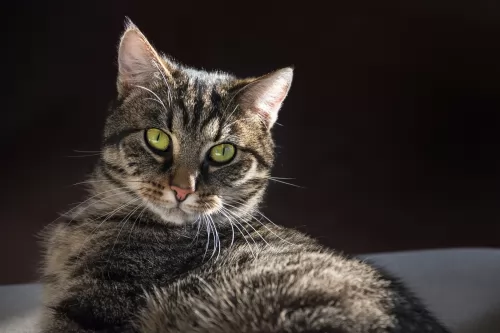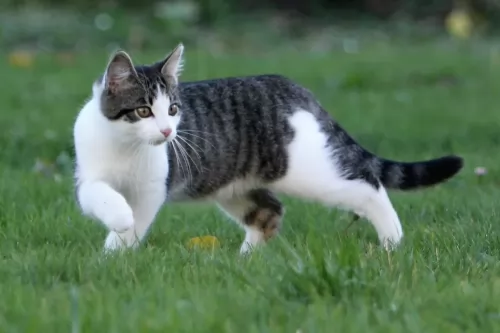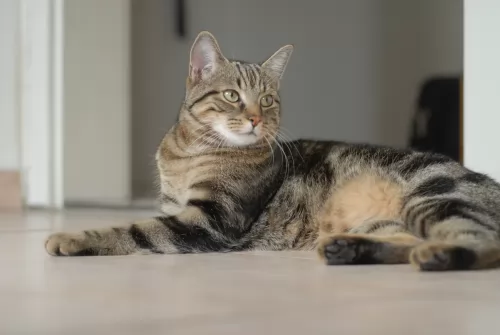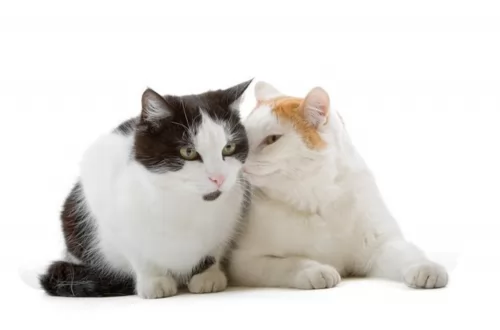 Petzlover
PetzloverEuropean Shorthair is originated from Sweden but Stone Cougar is originated from Egypt. European Shorthair may weigh 7 kg / 15 pounds lesser than Stone Cougar. Both European Shorthair and Stone Cougar has almost same life span. Both European Shorthair and Stone Cougar has same litter size. Both European Shorthair and Stone Cougar requires Low Maintenance.
 The European Shorthair is a cat breed that hails from Sweden but it also has roots that go back to the Roman Empire.
The European Shorthair is a cat breed that hails from Sweden but it also has roots that go back to the Roman Empire.
It is referred to as a natural cat breed, which means that the cat came about naturally without any human intervention.
The cat has had great hunting skills and this has what has made it sought after as a cat to keep rodents at bay. It became a famous housecat as well.
 These domestic cats of Europe are a medium- to large-sized cat, weighing between 4 and 6kg, though some can be heavier.
These domestic cats of Europe are a medium- to large-sized cat, weighing between 4 and 6kg, though some can be heavier.
The European Shorthair has a fairly large head and medium-sized ears. The body is robust and round shaped. The cat’s short coat without an undercoat comes in a range of colors and patterns such as white, cream, red, black and blue with eyes that are green, yellow, brown or copper or blue.
The European Shorthair is known for its adaptable nature and the cat is able to fit into different lifestyles with ease. It's a cat that will live happily with children, pets, adults and seniors.
The cat loves his human family and loves becoming involved with fun games and activities. It's an intelligent cat too and cat food puzzles help him to think about how to get his food.
Even though your cat is social with his human family, it becomes fairly shy and nervous of strangers.
 The European Shorthair is such a sweet cat and he is able to adapt fairly easily to new environments. It is such an ideal cat for households with singles, couples, families, and seniors as it adapts its personality to suit, getting on well with other pets as well.
The European Shorthair is such a sweet cat and he is able to adapt fairly easily to new environments. It is such an ideal cat for households with singles, couples, families, and seniors as it adapts its personality to suit, getting on well with other pets as well.
The cat loves his human family and wants to please, but loves to play too, being active and playful. Having one of these cats in your home is like bringing in a treasured gem.
 Even if your European Shorthair appears to be well, it is a good idea to get used to taking your cat to the vet for an annual check-up.
Even if your European Shorthair appears to be well, it is a good idea to get used to taking your cat to the vet for an annual check-up.
To provide your cat with the best chance to remain healthy, good diet and exercise is imperative. Look out for an itchy skin too as this could well be a sign that your cat is being plagued by parasites. Parasites can be a terrible problem and it will need to be attended to by your vet.
Parasites and an itchy skin can be a nightmare for your pet and make him most miserable with excessive scratching and licking as well as thinning of hair.
A new kitten will also require being vaccinated to ensure he remains healthy. These injections protect your cat from life-threatening diseases. Usually, vets start vaccines at between 8 – 12 weeks of age to protect your cat against the likes of Feline Leukaemia Virus, Feline Infectious Enteritis and Cat Flu.
There are also other vaccinations you might want to consider such as rabies and chlamydia.
 European Shorthairs like to groom themselves, but even so, you want to brush your cat once a week to keep the hair shiny and healthy. Make sure to trim your cat’s claws at the same time. It’s your time to feel for any unusual lumps or scratches on your feline friend’s skin. Check his eyes and make sure they are still bright and clear, look inside the ears to make sure they aren’t becoming clogged with dirt and wax and look inside the mouth to ensure no signs of gum- and tooth disease.
European Shorthairs like to groom themselves, but even so, you want to brush your cat once a week to keep the hair shiny and healthy. Make sure to trim your cat’s claws at the same time. It’s your time to feel for any unusual lumps or scratches on your feline friend’s skin. Check his eyes and make sure they are still bright and clear, look inside the ears to make sure they aren’t becoming clogged with dirt and wax and look inside the mouth to ensure no signs of gum- and tooth disease.
Your cat may well be outgoing with his human family, but his nervousness with strangers will require you providing him with a safe haven of his own. This might be his own bed which should be in a safe, dry, quiet area where he can retreat and feel more secure.
European Shorthairs love being outdoors and particularly if you have a female you’ll want her spayed to avoid her becoming pregnant. Cat shelters are already full of unwanted kittens and you don’t want to add to the burden. Also, have your male neutered too as he is ar less likely to want to roam. Spaying and neutering come with many health benefits too.
Be very careful of your cat’s diet. This is because the domestic cat is a carnivore and still essentially a predator, liking to hunt for their meat. They require a meat diet. However, cats have special dietary requirements and they require a balanced diet. All cats are individuals and they have different food likes and preferences, but they all need the best food there is to remain in peak condition. If you feed your cat commercially manufactured food, always follow the instructions on the label.
Provide your feline pet with cat accessories – food and water bowl, collar and tag, soft bedding, a climbing tree, scratching post, litter box, grooming accessories and toys.